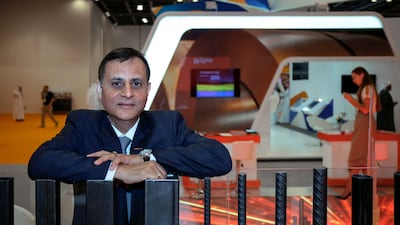A prominent UAE steel manufacturer has called for more support in terms of tariffs or other measures to prevent the dumping of cheap steel on to the UAE market.
Bharat Bhatia, the chief executive of Conares, last week met Abdulla Al Shamsi, the UAE assistant secretary for industrial affairs, and Karim Toumi, an international trade law expert from the Ministry of Economy, at his firm’s manufacturing plant in Jebel Ali to discuss the threat of cheaper steel imports to local producers.
Mr Bhatia, whose company produces steel rebar used in building, said: “We seek stronger support from the government to mitigate the damage to the local steel producers. This is because the ‘Made in UAE’ steel products are more reliable than imports. The UAE traders are keen to buy locally, save inventory costs and avoid price fluctuations.”
Conares said that an inflow of dumped steel has caused “massive damage” to local producers over the past few years.
“We are trying to address these challenges by providing quality certified items in conjunction with marketing ‘Made in UAE’ steel products, which we believe would help us avoid losing market share to foreign dumping,” he said. “The UAE is self-sufficient to cater to current demand of 3.5 to 4 million tonnes annually.”
Mr Al Shamsi said that GCC countries were continuing to study their options in terms of raising tariffs on imported steel with a view to protecting local producers.
“We have traditionally kept steel tariffs low to facilitate local building booms. There are lots of measures in place to control dumping of cheaper steal products from some countries, as this puts local steel producers at a tremendous disadvantage,” he said.
He said the government was “happy to extend additional support, as ‘Made in UAE’ products have not only gained market-wide acceptance but also are [the] preferred choice of many prestigious projects in the country today”.
The UAE has faced its own anti-dumping tariffs in recent months. In November, the United States International Trade Commission imposed charges on certain types of circular welded steel pipe that it said had been sold below market price. At the time, Abdulla Al Saleh, the UAE's undersecretary for Foreign Trade and Industry, said that it would challenge the decision and that it may take its case to the World Trade Organization (WTO) if its appeal went unheard.
Speaking last week, Mr Al Shamsi said it was “not in the key agenda for the UAE to approach the WTO” over the matter just yet.
“Approaching the WTO is just one of the options, as there are certain mechanisms needed to be in place before going to the organisation,” he said.
Steel prices have come under pressure in recent years because of the excess production from the Chinese market. China’s global share of steel production has grown from about 20 per cent in 2003 to about 45 per cent in 2015, according to World Steel Association figures. The amount of steel produced has increased from 971 million tonnes to 1.62 billion tonnes in the same period. Attempts to curtail production in 2016 have helped to underpin a recovery in prices.
According to the London Metal Exchange, steel rebar prices stood at just below US$420 per tonne at the end of January – up by 30 per cent on the same period a year earlier.
mfahy@thenational.ae
Follow The National's Business section on Twitter


